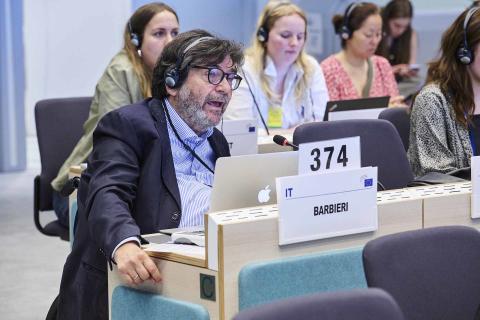European Economic
and Social Committee
A Healthier Union for All: Tackling Inequalities in Access to Healthcare
The EESC’s opinion on "Tackling inequalities in people's access to healthcare", led by rapporteur Pietro Vittorio Barbieri, builds on the principles of the European Pillar of Social Rights and the EU4Health programme. It calls for a more coordinated, transparent, and inclusive approach to healthcare policy—one that ensures no one is left behind due to financial, geographic, or social barriers.
Healthcare as a Fundamental Right
"This opinion seemed like a difficult challenge, caught in the vortex of divided skill levels and the principles of the Social Pillar. Some academic research centres and the WHO Europe confirm the validity of the analysis. Therefore, in addition to calling on Member States to adapt their policies, the Commission is asked to commit to including inequalities in access to healthcare services in the EU4Health program and to find ways to provide common professional content for individual services," explains rapporteur Pietro Barbieri .
The EESC stresses that access to healthcare is not a privilege but a fundamental right. It calls for the full implementation of Principles 16 and 18 of the Social Pillar, which guarantee timely access to quality healthcare and long-term care services. These rights must be backed by adequate public investment and clear national commitments.
Bridging the Gaps: From Policy to Practice
The opinion identifies a troubling rise in unmet healthcare needs, particularly among low-income groups, people with disabilities, and older citizens. In 2023, 2.2% of the lowest income quintile reported unmet medical needs due to cost, compared to just 0.2% of the highest quintile.
The EESC warns that without targeted action, these disparities will only grow.
To address this, the Committee recommends:
- Reducing or reimbursing healthcare and long-term care costs for low-income households.
- Strengthening social protection systems and minimum income schemes.
- Investing in public healthcare infrastructure and workforce capacity.
- Promoting inclusive health policies through the exchange of good practices.
Towards a European Care Guarantee
The EESC reiterates its call for a European Care Guarantee—a framework that would ensure all EU residents have access to affordable, quality healthcare and care services. This includes addressing labour shortages, improving working conditions in the care sector, and ensuring that services are accessible to all, regardless of income or location.
The Committee also supports the development of a common classification system for health and social services, to enable better comparisons, joint analysis, and shared guidelines across Member States.
A Role for the EU: From Coordination to Commitment
While healthcare remains a national competence, the EESC believes the EU has a vital role to play in promoting equity and solidarity. It calls on the European Commission to:
- Integrate healthcare access inequalities into the EU4Health programme
- Develop EU-level guidelines to address financial, organisational, and discriminatory barriers
- Monitor the implementation of the Social Pillar and ensure Member States uphold their responsibilities.
The EESC also highlights the importance of involving civil society and social partners in shaping and evaluating healthcare policies, ensuring that reforms are grounded in real-life needs.
A Call to Action
At a time when economic pressures and demographic shifts are straining Europe’s health systems, the EESC’s message is clear: health equity must be a priority. Only by addressing the root causes of inequality and investing in inclusive, resilient healthcare systems can the EU deliver on its promise of a Union that protects and empowers all its citizens.
